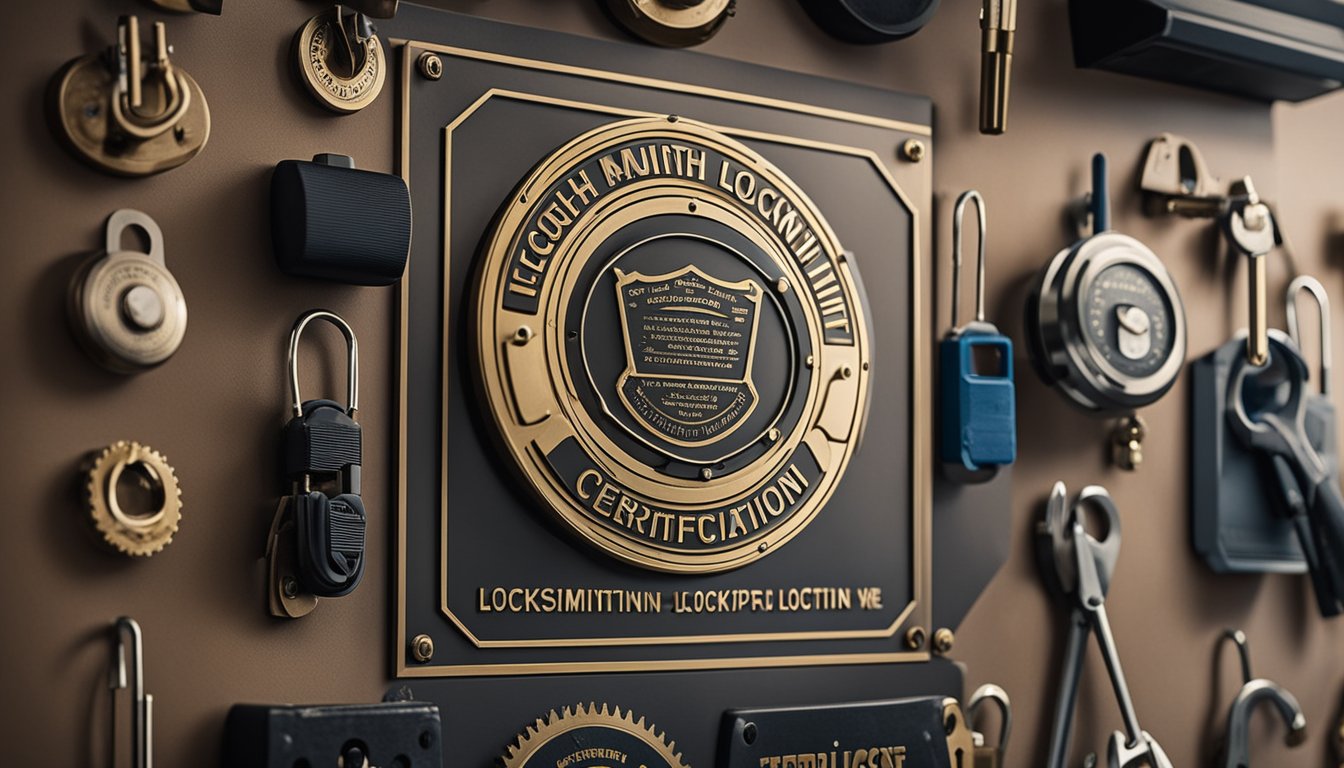Late updated: 26 Mar 2025 09:03
Written by: Elena Prescott
Understanding Locksmith Certifications in the UK: Essential Guide for Professionals
Navigating the world of locksmith certifications in the UK can feel daunting, yet it's an essential journey for both aspiring locksmiths and those seeking locksmith services. Locksmith certifications not only validate skills and competence but also instil trust and confidence in clients who are seeking secure solutions. The most recognised and prestigious certification in the UK is provided by the Master Locksmiths Association (MLA), which is regulated by OFQUAL and certified by ABBE.

To meet diverse security needs, locksmiths must pursue rigorous training and gain practical experience. Many organisations offer these courses, but the MLA stands out due to its high standards and established reputation. This also assures clients of the locksmith’s integrity and reliability, providing peace of mind.
By understanding locksmith certifications, we can ensure that our security needs are addressed by professionals trained to the highest standards. Engaging a certified locksmith ensures that services rendered are trustworthy and aligned with industry standards.
Key Takeaways
- Locksmith certifications ensure reliable and secure services.
- The Master Locksmiths Association offers the UK’s most recognised certification.
- Certified locksmiths provide peace of mind by meeting high industry standards.
Understanding Locksmith Certifications in the UK

In the UK, locksmith certification is essential for maintaining high industry standards and ensuring credibility. Certified locksmiths benefit the public by offering reliable, ethical services. Our focus is to highlight the certification process and the key pathways to becoming a certified locksmith in the UK.
Overview of the Locksmith Industry
The locksmith industry in the UK is a vital part of security solutions, ensuring both residential and commercial properties remain safe. Transparency and ethical practices are essential. Trust and safety are central concerns. Locksmiths must be well-versed in technical skills and updated on industry standards to provide the latest solutions.
Competition is fierce, making certifications a valuable asset in building credibility. Accredited individuals demonstrate their commitment to professionalism and continuous education, positioning themselves as trusted, reliable choices for consumers seeking security expertise.
The Importance of Certified Locksmiths
Choosing the right locksmith is pivotal for security. Certified locksmiths provide assurance of competence and adherence to ethical standards. They undergo rigorous training through formal courses, gaining both theoretical knowledge and hands-on experience. This professional training helps us reliably address varied security challenges.
Avoiding uncertified locksmiths reduces risks of inferior service or unethical practices. Our certification ensures locksmiths are up-to-date with the latest industry innovations, allowing them to offer modern solutions. This commitment to ongoing learning is key to maintaining trust with clients.
Types of Locksmith Certifications
There are various certifications within the UK, each validating specific skill sets. Among them, the Master Locksmiths Association (MLA) qualification stands out, being the highest regulated by OFQUAL and certified by ABBE. This certification sets a benchmark for quality and professionalism in locksmith services.
Certification types may also include specialties in specific locks or security systems, offering diversification in locksmith careers. A clear understanding of these certifications guides individuals in choosing the most aligned option with their career goals, catering to different market needs.
Routes to Certification
Achieving certification in the UK involves a structured pathway. Candidates must usually be over 18 and possess a clean criminal record. Training courses, such as those offered by organisations like the MLA, provide intensive learning experiences.
Courses can range from short introductory programs to extensive multi-year training, giving individuals the necessary formal training to master essential locksmithing techniques. Continuous education is encouraged, ensuring skills remain sharp and aligned with evolving security technologies.
As we work towards professional certification, we gain not only technical skills but also credibility and trust from clients seeking secure, ethical locksmith solutions.
Locksmith Certification and Services

In the UK, locksmith certification serves as a cornerstone for maintaining high standards in the industry. Certified locksmiths offer a range of services, ensuring security and trust for residential and commercial clients.
Residential Locksmith Services
Residential locksmith services focus on securing our homes and offering peace of mind. We deal with everything from traditional lock replacement to the installation of modern smart locks. A certified locksmith's role includes advising homeowners on the best security measures and products. They ensure confidentiality and professionalism, backed by disclosures like DBS or CRB checks.
Proper training and certification enable locksmiths to handle diverse challenges. Whether it's key cutting or installing alarm systems, certified professionals bring both expertise and reliability to our doorsteps.
Commercial Locksmith Services
For commercial properties, security needs become more complex. Certified locksmiths provide tailored security solutions, ensuring our business operations are safeguarded. We often see a need for advanced security systems, including access control and CCTV installations.
Professional certification encompasses extensive course work and practical training, equipping us to handle high-level security demands. With reviews and recommendations, clients can trust that our services will meet their stringent requirements, guaranteeing the security and confidentiality of commercial assets and information.
The Role of Continuous Professional Development
Continuing professional development is vital in the ever-evolving locksmith industry. Our commitment to ongoing training ensures we remain adept with the latest technologies and security solutions. Participation in accredited courses goes beyond obtaining initial certification, emphasising lifelong learning.
Through programmes offered by the MLA and Keytek Academy, among others, we improve our skills under experienced tutors. This approach not only enhances our competence but also builds trust with clients, assuring them of our dedication to providing the best security services.
Ensuring Trustworthiness and Security
Trustworthiness in locksmith services is non-negotiable. As professionals, we acknowledge the significant responsibility that comes with accessing client properties. Comprehensive background checks, such as DBS or CRB, are essential to verify our integrity and assure clients.
Additionally, being certified allows us to operate under established standards, further reinforcing customer trust. When clients contact us for locksmith services, they can be confident in our capability to provide secure, reliable, and professional solutions that align with their needs.
Frequently Asked Questions
We have compiled key questions regarding locksmith certifications in the UK. This covers qualification paths, industry requirements, career prospects, recognised certifications, course costs, and potential earnings.
How can one become a qualified locksmith in the UK?
To become a qualified locksmith, enrolling in a professional training course is essential. These courses are designed to equip individuals with the necessary skills and knowledge. Though there are no formal qualifications mandated, joining the UK Locksmiths Association can be beneficial as it offers additional credibility.
Do locksmiths in the UK require a licence to operate?
Locksmiths in the UK are not required to hold a licence. However, completing recognised training can help establish a locksmith's reputation and reliability. This can also increase one's employability and client trust.
Is pursuing a career as a locksmith in the UK a worthwhile investment?
A locksmith career in the UK can be a rewarding investment given the demand for security services. Many people seek locksmiths for a variety of services, from emergency lockouts to installing advanced security systems. With the right skills and marketing, career prospects can be positive.
What are the most recognised certifications for locksmiths in the UK?
The UK Locksmiths Association and other professional bodies offer certifications that are widely recognised. These credentials demonstrate a locksmith's expertise and commitment to high standards. Some training providers also offer their own certifications, which can enhance one's professional standing.
What are the costs associated with locksmith certification courses in the UK?
The costs of locksmith certification courses vary based on duration and provider. Typically, these courses range from a few hundred to several thousand pounds. It is important to research course offerings and compare various options to find the best fit for one's budget and career goals.
How much can a locksmith expect to earn in the UK?
Earnings for locksmiths in the UK can vary widely. On average, a trained locksmith can earn between £20,000 and £35,000 per year. Experienced locksmiths and those offering specialised services may earn more. Factors such as location, market demand, and expertise significantly influence earning potential.
